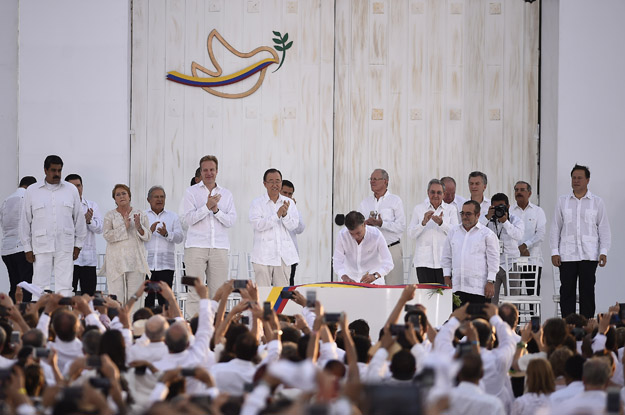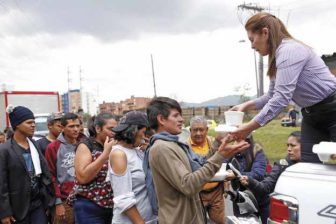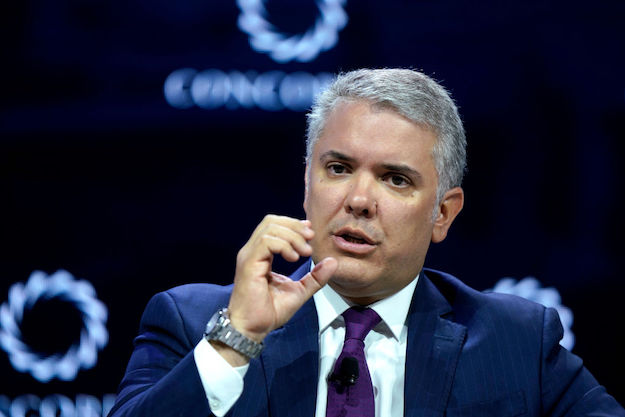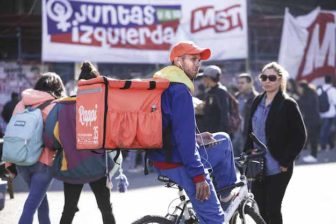Salvaging peace in Colombia might still be possible, according to several positive signs from all actors in Colombia’s conflict over the past week or so.
The awarding of the Nobel Peace Prize to Colombian President Juan Manuel Santos, just days after the peace accord between the government and Revolutionary Armed Forces of Colombia (FARC) was narrowly defeated in a national plebiscite, provided a needed boost to peace efforts at home and abroad. A communiqué by the government and FARC pledging to maintain the ceasefire and seek a political solution was also encouraging, as was an agreement by the smaller National Liberation Army (ELN), which has engaged in endless “talks about talks,” to sit down with government negotiators at the end of October.
An unprecedented call by 400 of Colombia’s leading business leaders for a “Grand National Pact,” urging all sides to dedicate “maximum effort” to the search for a “definitive, inclusive, and sustainable agreement” provided yet another boost. And then, capping off a dizzying sequence of events, former president Álvaro Uribe, the leading protagonist of the “No,” laid out a dozen or so specific proposals for modifying the agreement, touching on issues from the fumigation of drug crops to the thorny issue of transitional justice.
The nature of the demands—coupled with the first face-to-face meeting between Uribe and Santos in more than six years—offer hope that a new agreement with a broader base of support can be reached. Perhaps the most striking aspect of Uribe’s list is what is absent—the demand for jail time for FARC commanders who committed the worst atrocities of the civil war. Numerous journalistic accounts and my own interviews suggest that the issue of transitional justice was the decisive, albeit not the only factor in the triumph of the “No.” This is because the accord signed by Santos and the FARC in late September allows FARC leaders implicated in human rights crimes to avoid prison if they confess their crimes fully, agree to “restrictions on liberty,” and offer concrete reparations to victims. Uribe’s proposal draws on a suggestion by former Conservative Party presidential candidate Marta Lucía Ramírez in insisting on “effective seclusion” (reclusión efectiva) but allows for sentences to be carried out on farms rather than prison. Dropping the insistence that guerrilla human rights abusers spend time behind bars represents a significant concession on the part of the “No.”
Also conciliatory among the measures Uribe set forth is the lack of explicit opposition to the FARC’s 10 guaranteed seats in the Colombian legislature (five in each chamber) over the next two electoral cycles. Instead, Uribe’s proposal—videotaped and publicized via Twitter—aims at prohibiting the political participation of those who have committed “atrocious crimes.” This is a ban that currently applies to others in Colombia convicted of collusion with paramilitary groups and other political crimes.
Provided there remains sufficient will on all sides, Uribe’s proposals may afford an opening to achieve a national consensus over peace, one far broader than the 54,000 votes by which the “No” campaign won. There are hard questions, however, that leave room for great uncertainty. Do diverse actors in the “No” coalition agree that Uribe’s proposals constitute the agenda going forward, or will the coming days see an endless stream of demands from a group heady from its October 2 victory? Do Uribe and his supporters believe that all their proposals need to be accepted, or are they open to the fundamental give-and-take of any real negotiation? Will the FARC, convinced that the accord signed on September 26 is a binding agreement, accept changes that toughen the terms to which they’ve agreed? Is the ELN committed to joining a national consensus about peace, or will it drag out negotiations once they’ve started? Will the Santos government, after signing what chief negotiator Humberto de la Calle called an “accord of the possible,” be able to navigate between the FARC and “No” voters in order to salvage the peace? Most importantly, do all sides understand that the time frame for making changes is a matter of weeks, not months, at which point the bilateral ceasefire with the FARC could easily unravel?
There is no roadmap for the way forward. The United States, however, can play a fundamental role in enhancing the possibility for success. The Obama administration has been resolute in backing the peace process under President Santos; following the defeat of the plebiscite, Secretary of State John Kerry expressed support for new efforts towards “inclusive dialogue.” For the fiscal year that just ended, the Republican-led Congress offered more foreign aid to Colombia in the event of a peace accord than the administration itself had requested. This strong demonstration of bipartisanship continues the pattern that has characterized U.S.-Colombian relations for over 15 years. Strong messages toward conciliation and flexibility must now emanate from all quarters. White House Special Envoy for Colombia, Bernard Aronson, has earned the trust of the FARC even while saying difficult things. If requested by the Colombian government, he must continue to convey a strong dose of reality therapy, to the FARC as well as the ELN. Congressional Republicans with whom Uribe has maintained close contact since leaving office can play a critical role in urging flexibility and compromise on all sides.
All of Colombian society, backed by bipartisan majorities in the United States, have an obligation to rescue the opportunity to end 52 years of war with the FARC, and potentially with the ELN. The best solution is one for which all can claim credit. The silver lining in the cloud of the “No” vote may be precisely that new chance.
—
Arnson is the director of the Latin American Program at the Woodrow Wilson Center in Washington, D.C.









